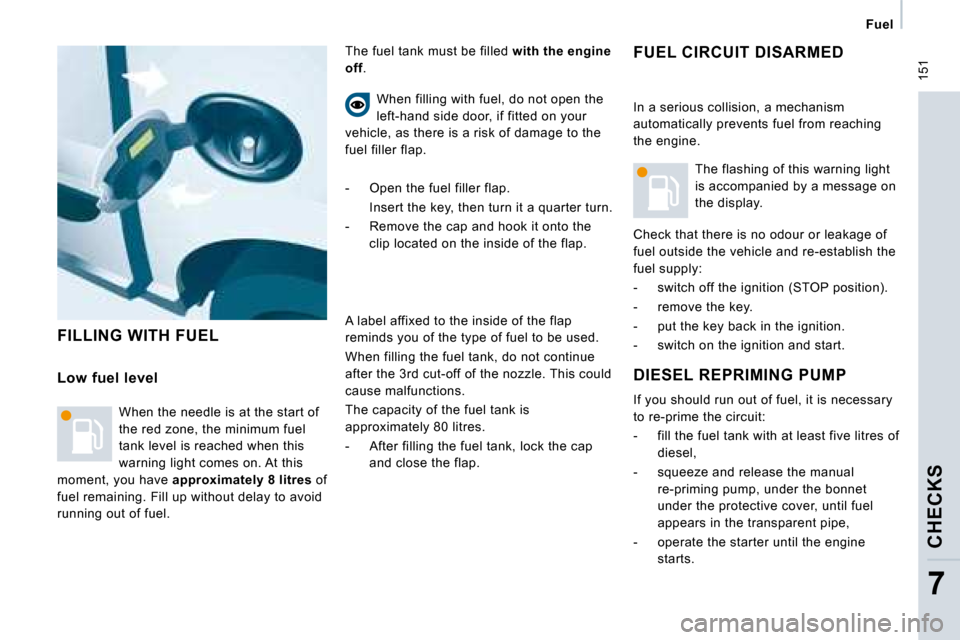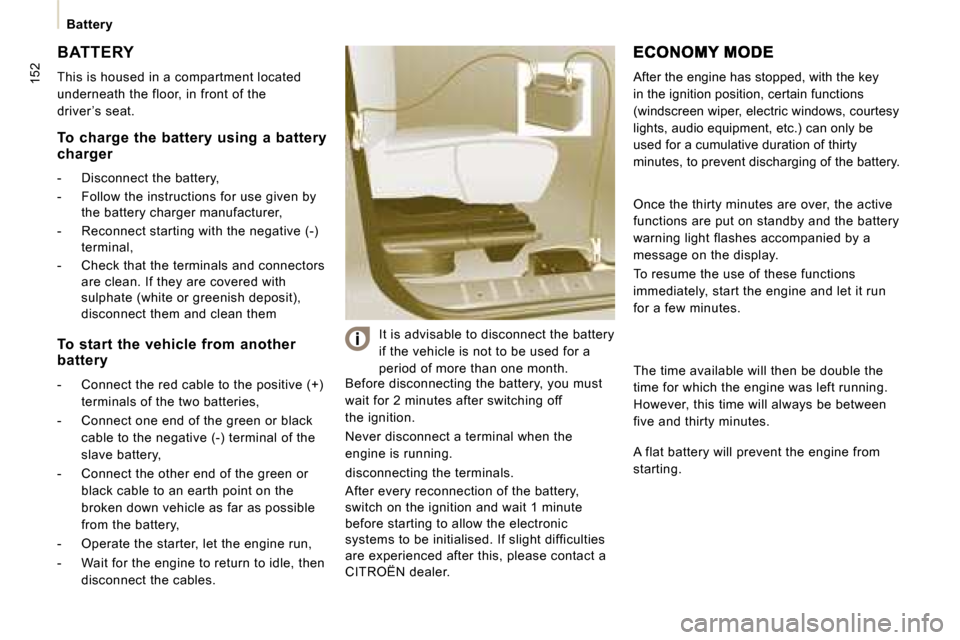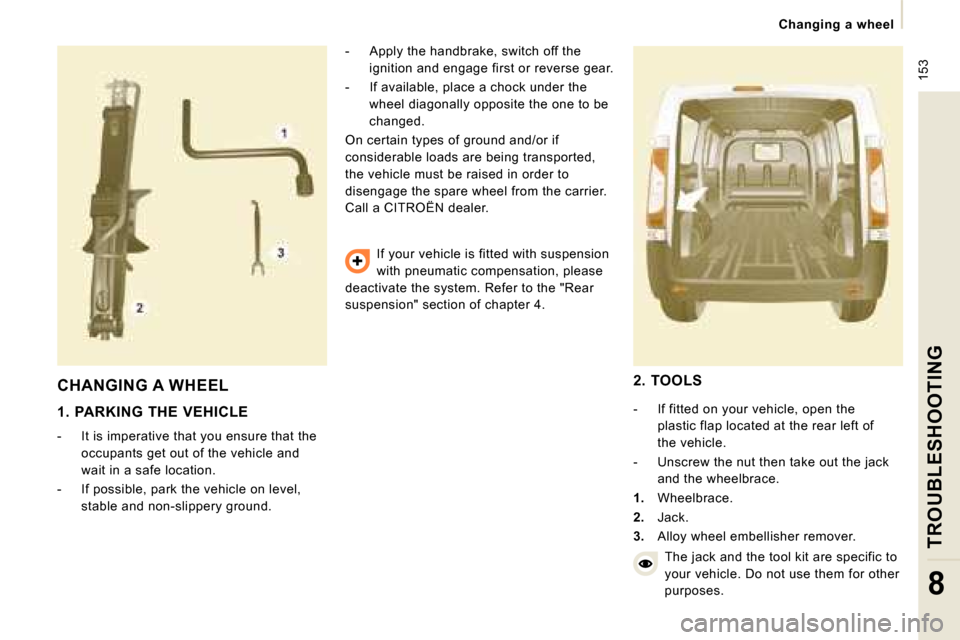Citroen JUMPY 2008.5 2.G Owner's Manual
Manufacturer: CITROEN, Model Year: 2008.5, Model line: JUMPY, Model: Citroen JUMPY 2008.5 2.GPages: 185, PDF Size: 6.66 MB
Page 151 of 185

148
Checks
CHECKS
Battery
At the start of winter, have your battery
checked by a CITROËN dealer.
Brake pads
Brake pad wear depends on the style of
driving, in particular for vehicles which are
used in town, over short distances. It may
be necessary to check the thickness of the
pads, even between services.
Unless there is a leak on the circuit, a drop
in the brake fluid level indicates that the
brake pads are worn.
Brake disc/drum wear status
For any information relating to checking
the brake disc/drum wear status, contact a
CITROËN dealer.
Handbrake
Where the handbrake travel is too great
or there is a reduction in the performance
of the system, the handbrake should be
adjusted, even between services.
Have the system checked by a CITROËN
dealer. Oil filter
Change the filter regularly, in accordance
with the servicing schedule.
Carbon filter and passenger
compartment filter
The carbon filter permits continuous and
effective filtering of dust.
If the passenger compartment filter becomes
clogged, this may reduce the performance
of the air conditioning system and generate
unpleasant odours.
We recommend the use of a combined
passenger compartment filter. By means of
its second special active filter, it contributes
to the purification of the air breathed by
the occupants and the cleanness of the
passenger compartment (reduction of
allergic symptoms, unpleasant odours and
greasy deposits).
Refer to the servicing booklet to find out the
replacement interval for these components.
Depending on the environment (dusty
atmosphere...) and the use of the vehicle
(urban driving...), change them twice as
often if necessary.
Refer to the "Under the bonnet" section of
chapter 7. Particle emission filter (Diesel)
It is imperative that particle
emission filter maintenance is
carried out by a CITROËN dealer.
On acceleration after the vehicle
has been running for a prolonged period
at very low speed or at idle, you may, in
exceptional circumstances, notice the
emission of water vapour at the exhaust.
This water vapour does not have any
adverse effect on vehicle handling or the
environment.
Page 152 of 185

149
Checks
CHECKS
7
Manual gearbox
Have the level checked in accordance with
the manufacturer ’s servicing schedule. To check the main levels and certain
components, in accordance with the
manufacturer ’s servicing schedule, refer
to the pages of the servicing booklet which
correspond to your vehicle’s engine.
Only use products recommended by
CITROËN or products of equivalent
quality and characteristics.
In order to optimise the operation of units as
important as the braking circuit, CITROËN
selects and offers specific products.
In order to avoid damaging the electrical
units, high pressure washing to clean the
engine compartment is strictly prohibited.
Bleeding the water contained in the
diesel filter
If this warning light comes on,
bleed the filter. Otherwise bleed
regularly each time the engine is
drained.
To evacuate the water, unscrew the bleed
screw located on the filter.
Operate until all of the water in the
transparent pipe has been drained out then
tighten the bleed screw.
HDi engines use advanced technology.
All work requires a special qualification
which is guaranteed by a CITROËN dealer.
1.6 litre HDi
2 litre HDi
Page 153 of 185

151
Fuel
CHECKS
7
FILLING WITH FUEL
FUEL CIRCUIT DISARMED The fuel tank must be filled with the engine
off .
DIESEL REPRIMING PUMP
If you should run out of fuel, it is necessary
to re-prime the circuit:
- fill the fuel tank with at least five litres of
diesel,
- squeeze and release the manual re-priming pump, under the bonnet
under the protective cover, until fuel
appears in the transparent pipe,
- operate the starter until the engine starts.
Low fuel level
When the needle is at the start of
the red zone, the minimum fuel
tank level is reached when this
warning light comes on. At this
moment, you have approximately 8 litres of
fuel remaining. Fill up without delay to avoid
running out of fuel. When filling with fuel, do not open the
left-hand side door, if fitted on your
vehicle, as there is a risk of damage to the
fuel filler flap.
- Open the fuel filler flap.
Insert the key, then turn it a quarter turn.
- Remove the cap and hook it onto the clip located on the inside of the flap.
A label affixed to the inside of the flap
reminds you of the type of fuel to be used.
When filling the fuel tank, do not continue
after the 3 rd cut-off of the nozzle. This could
cause malfunctions.
The capacity of the fuel tank is
approximately 80 litres.
- After filling the fuel tank, lock the cap and close the flap. In a serious collision, a mechanism
automatically prevents fuel from reaching
the engine.
The flashing of this warning light
is accompanied by a message on
the display.
Check that there is no odour or leakage of
fuel outside the vehicle and re-establish the
fuel supply:
- switch off the ignition (STOP position).
- remove the key.
- put the key back in the ignition.
- switch on the ignition and start.
Page 154 of 185

152
Battery
BATTERY
This is housed in a compartment located
underneath the floor, in front of the
driver ’s seat. Before disconnecting the battery, you must
wait for 2 minutes after switching off
the ignition.
Never disconnect a terminal when the
engine is running.
disconnecting the terminals.
After every reconnection of the battery,
switch on the ignition and wait 1 minute
before starting to allow the electronic
systems to be initialised. If slight difficulties
are experienced after this, please contact a
CITROËN dealer. It is advisable to disconnect the battery
if the vehicle is not to be used for a
period of more than one month. After the engine has stopped, with the key
in the ignition position, certain functions
(windscreen wiper, electric windows, courtesy
lights, audio equipment, etc.) can only be
used for a cumulative duration of thirty
minutes, to prevent discharging of the battery.
To charge the battery using a battery
charger
- Disconnect the battery,
- Follow the instructions for use given by
the battery charger manufacturer,
- Reconnect starting with the negative (-) terminal,
- Check that the terminals and connectors are clean. If they are covered with
sulphate (white or greenish deposit),
disconnect them and clean them
To start the vehicle from another
battery
- Connect the red cable to the positive (+) terminals of the two batteries,
- Connect one end of the green or black cable to the negative (-) terminal of the
slave battery,
- Connect the other end of the green or black cable to an earth point on the
broken down vehicle as far as possible
from the battery,
- Operate the starter, let the engine run,
- Wait for the engine to return to idle, then disconnect the cables. Once the thirty minutes are over, the active
functions are put on standby and the battery
warning light flashes accompanied by a
message on the display.
To resume the use of these functions
immediately, start the engine and let it run
for a few minutes.
The time available will then be double the
time for which the engine was left running.
However, this time will always be between
five and thirty minutes.
A flat battery will prevent the engine from
starting.
Page 155 of 185

153
Changing a wheel
TROUBLESHOOTING
8
CHANGING A WHEEL
1. PARKING THE VEHICLE
- It is imperative that you ensure that the occupants get out of the vehicle and
wait in a safe location.
- If possible, park the vehicle on level, stable and non-slippery ground. - Apply the handbrake, switch off the
ignition and engage first or reverse gear.
- If available, place a chock under the wheel diagonally opposite the one to be
changed.
On certain types of ground and/or if
considerable loads are being transported,
the vehicle must be raised in order to
disengage the spare wheel from the carrier.
Call a CITROËN dealer.
If your vehicle is fitted with suspension
with pneumatic compensation, please
deactivate the system. Refer to the "Rear
suspension" section of chapter 4.
2. TOOLS
- If fitted on your vehicle, open the plastic flap located at the rear left of
the vehicle.
- Unscrew the nut then take out the jack and the wheelbrace.
1. Wheelbrace.
2. Jack.
3. Alloy wheel embellisher remover.
The jack and the tool kit are specific to
your vehicle. Do not use them for other
purposes.
Page 156 of 185

154
Changing a wheel - Open the cover, located on the sill, to access the carrier bolt.
- Unscrew the bolt using the wheelbrace until the carrier is lowered fully. - Detach the carrier from the hook and
place the spare wheel near the wheel to
be changed.
3. SPARE WHEEL
- Gain access to the spare wheel from
the rear.
- Open the rear doors. You can switch on the courtesy light
to increase the light.
Page 157 of 185

155
Changing a wheel
TROUBLESHOOTING
8
4. OPERATING PROCEDURE Do not extend the jack until you have started
unscrewing the bolts on the wheel to be
changed and have placed the chock under
the wheel diagonally opposite.
- Remove the trim pulling it using the
embellisher remover.
- Loosen the wheel bolts and start unscrewing them.
- Place the jack in contact with the locating point provided, the one which is
closest to the wheel to be changed.
Ensure that the jack is straight and that the base of the jack is fully in contact
with the ground.
- Extend the jack to lift the wheel clear of the ground.
- Resume and complete the unscrewing of the wheel bolts.
- Remove the bolts and remove the wheel. Special tools for vehicles fitted
with alloy wheels
If your vehicle has wheels with alloy rims:
- The embellisher is removed using the
alloy wheel embellisher remover.
� � �-� � �E�a�c�h� �w�h�e�e�l� �i�s� �fi� �t�t�e�d� �w�i�t�h� �a�n� �a�n�t�i�-�t�h�e�f�t� �b�o�l�t�.�
- These bolts can be loosened using your anti-theft socket (given to you
on delivery of your vehicle) and the
wheelbrace.
Page 158 of 185

Changing a wheel - Lower the vehicle completely by folding the jack, then remove the jack.
- Tighten the bolts again using the wheelbrace, tighten them fully without
forcing them.
- Place the wheel to be repaired in the carrier. - Secure the carrier on the hook then
raise the carrier using the bolt and the
wheel brace.
- Remember to close the flap, located on the sill.
- Store the trim in the vehicle.
Never go underneath the vehicle
when it is supported only by the jack.
Never use a screwdriver in place of the
wheelbrace.
5. FITTING THE SPARE WHEEL
- Position the wheel on the hub and start
tightening the wheel bolts by hand.
- Carry out an initial tightening of the bolts using the wheelbrace.
Page 159 of 185

157
Snow screen
TROUBLESHOOTING
8
6. REFITTING THE REPAIRED WHEEL
The wheel is refitted as described in step 5,
not forgetting to refit the wheel trim.
The spare wheel is not designed to be used
over long distances. Have the tightening of
the bolts and the tyre pressure checked by a
CITROËN dealer as soon as possible. Also,
have the original wheel repaired and refitted
by a CITROËN dealer as soon as possible. Refer to the "Identification features"
section of chapter 9 to locate the tyre
label.
REMOVABLE SNOW SCREEN
According to country, the removable snow
screen is installed on the lower part of the
front bumper to prevent the accumulation of
snow at the radiator cooling fan.
FITTING
- Offer up the snow screen facing its
centring pin A on the front bumper.
- Put it in place by pressing at each clip B
located in the four corners.
Do not forget to remove the snow screen
when the exterior temperature is higher than
10°C (no risk of snowfall) and when towing. REMOVAL
- Pass a screwdriver into the hole located
near each of the clips.
- Use the screwdriver as a lever to unclip the four clips B in turn.
Page 160 of 185

157
Snow screen
TROUBLESHOOTING
8
6. REFITTING THE REPAIRED WHEEL
The wheel is refitted as described in step 5,
not forgetting to refit the wheel trim.
The spare wheel is not designed to be used
over long distances. Have the tightening of
the bolts and the tyre pressure checked by a
CITROËN dealer as soon as possible. Also,
have the original wheel repaired and refitted
by a CITROËN dealer as soon as possible. Refer to the "Identification features"
section of chapter 9 to locate the tyre
label.
REMOVABLE SNOW SCREEN
According to country, the removable snow
screen is installed on the lower part of the
front bumper to prevent the accumulation of
snow at the radiator cooling fan.
FITTING
- Offer up the snow screen facing its
centring pin A on the front bumper.
- Put it in place by pressing at each clip B
located in the four corners.
Do not forget to remove the snow screen
when the exterior temperature is higher than
10°C (no risk of snowfall) and when towing. REMOVAL
- Pass a screwdriver into the hole located
near each of the clips.
- Use the screwdriver as a lever to unclip the four clips B in turn.